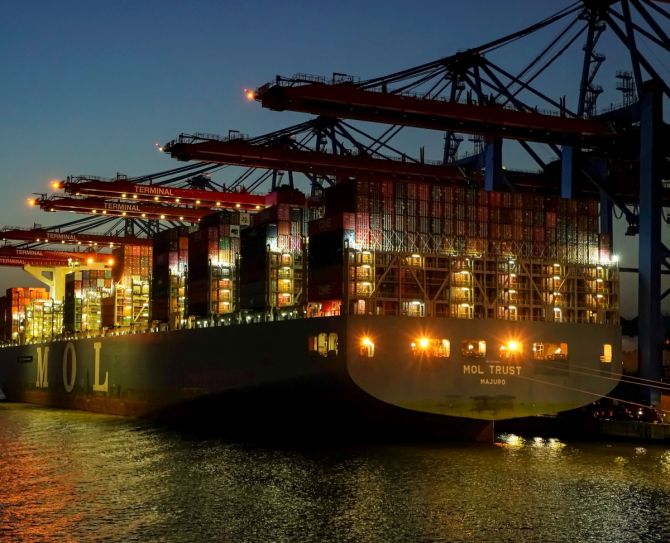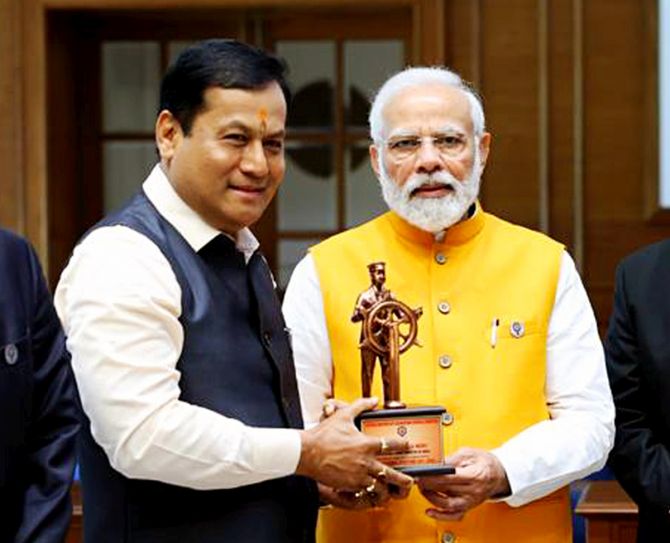'An area of land has already been earmarked for their protected habitation.'
'There are also steps being taken to take care of the coral zone and mangroves'

The shipping sector will be crucial for reducing India's cost of logistics to 7-8 per cent of GDP.
Despite the rapid pace of infrastructure development, several of these projects face criticism because of their environmental impact.
The Rs 72,000-crore (Rs 720 billion) Great Nicobar Island development is one such project.
Union Minister for Ports, Shipping and Waterways, Sarbananda Sonowal tells Dhruvaksh Saha/Business Standard the Centre is confident about going forward with it.
Great Nicobar Transhipment Port has been under scrutiny over environmental concerns. Are there any second thoughts on the project?
We have no second thoughts on the project.
The expression of interest round has been completed, and several parties have shown interest.
It is true that different stakeholders have raised environmental concerns, but those have been clearly addressed.
We followed all procedures and had a public hearing too.
It was after this that we were given environmental clearance.
Moreover, bodies like the Wildlife Institute of India, Zoological Survey of India, and Botanical Survey of India have been given the responsibility to protect the rare and endangered species of flora and fauna there.
An area of land has already been earmarked for their protected habitation.
There are also steps being taken to take care of the coral zone and mangroves.
The Adani group, which was recently under attack, is working in public-private partnership (PPP) mode with the ministry, apart from operating its own ports. Has there been any impact in view of developments related to the Hindenburg report?
There's not been any impact on PPP from the issue.
Generally, we have been very successful with PPP, and so far there's not been any development on PPP projects that the company is doing with our ports.

What is the progress on the Chabahar port's long-term agreement?
The government has been making efforts to finalise and activate the long-term contract.
Meanwhile, short-term contracts have been under execution, enabling us to operate the terminals.
Recently, during the visit of the Iranian delegation to India (during the third week of January 2023) the activation of the long-term contract was discussed, and both sides have made substantial progress towards finalising its amended provisions.
Both countries will work together because it is a strategically important project.
I won't give a specific date or month, but we can expect something within a short span of time.
All rounds of talks have been productive so far.
With the latest infra push by the Centre, what are your near-term objectives for the sector and the ministry, especially the Sagarmala plan?
The shipping sector is the key to economic growth because almost 90 per cent of export-import cargo is handled through shipping.
Considering the opportunities, Prime Minister Narendra Modi has developed a vision to make all major ports globally competent to handle the highest volumes of cargo.
Under Sagarmala, we have identified 802 projects of Rs 5.4 trillion by 2035.
In this, 221 projects, worth Rs 1.12 trillion, have been completed and 252, worth Rs 2.29 trillion, are under implementation.
What are the plans on coastal shipping and what policy interventions have been planned to attract private interest?
Coastal shipping is crucial, especially in connecting hinterlands with nearby ports and establishing cargo connectivity.
In the previous nine years, between 2014 and 2022, coastal cargo grew from 75 million tonnes to 133 million tonnes.
It shows coastal shipping is now on a self-sustaining growth track, and viability is visible.
There are so many interested parties that are going to invest in coastal shipping, because of the growing viability and development of allied infrastructure.
The outlay on viability gap funding for coastal shipping is being worked out.
The Budget announcement on enhancing coastal shipping through PPP and viability gap funding means an in-principle push for the sector.
As the nodal ministry, we will explore all possibilities and the policy decision will be made in consultation with the ministry of finance.
How do you foresee development in the country's inland waterways?
Cargo capacity in inland waterways grew from 16 million tonnes in 2014 to 109 million tonnes in 2022 -- this shows the rapid pace of growth.
The route helped us create history with the launch of the MV Ganga Vilas, the world's longest river cruise.
Earlier, people believed the Ganga and Brahmaputra did not have the depth for such operations.
When the PM flagged the cruise off, many in the Opposition made the same criticism, but the success of the cruise has shown that 27 river systems are feasible for seamless transportation.
Feature Presentation: Rajesh Alva/Rediff.com












 © 2025
© 2025